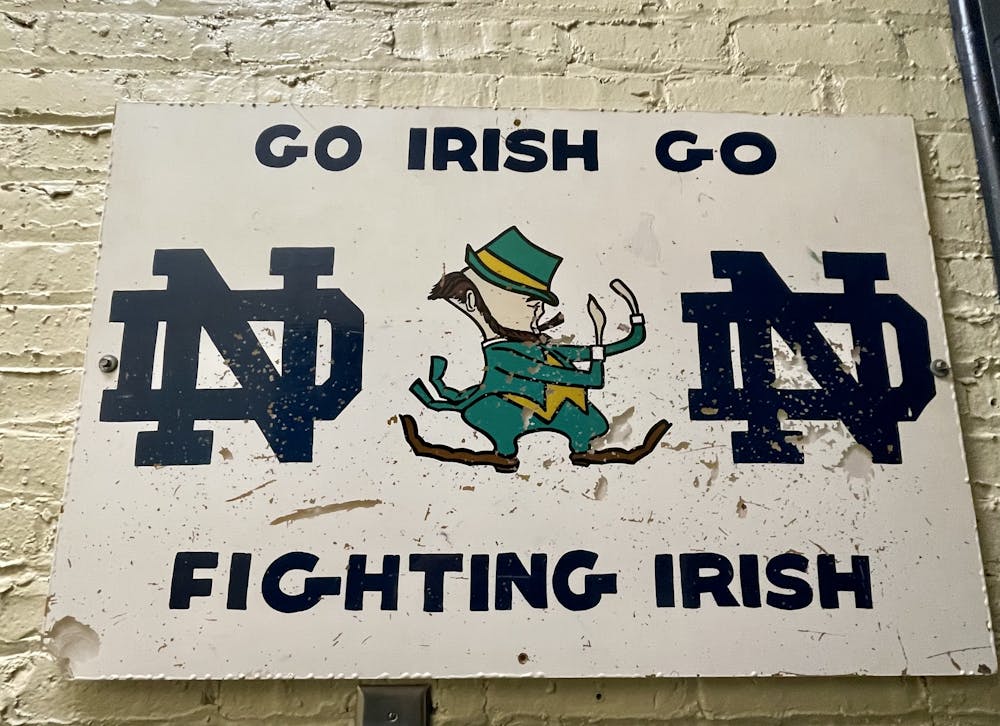Every autumn weekend, it is a near certainty you spend much of your time shouting “GO IRISH! BEAT TROJANS!” or some other iteration of our familiar chant. At least that’s how I spend fall semester Saturdays. You are probably looking forward to celebrating St. Patrick’s Day at the University with a self-proclaimed Irish identity, or did so this past weekend. Maybe you’ve noticed every Irish student on campus wearing a Claddagh ring, or maybe you are, like myself, one of the Irish students wearing a Claddagh ring.
You may consider yourself to be one of the Fighting Irish. And if you do, you should learn something about Ireland while you're here.
In 2006, Ireland’s president Mary McAleese said at Notre Dame, “For the Irish in America, well, as like the Irish everywhere in the world, that language that you use here, the Fighting Irish, we don’t mean fighting in the sense of argumentative . . . but what we actually mean mostly when we talk about it is an indomitable spirit, a commitment, never tentative, always fully committed . . . total commitment to life itself.”
To be Fighting Irish, you should be committed to being the Fighting Irish and to knowing what that means.
When people ask you why Notre Dame is known as the Fighting Irish, you want to know why, or at least I hope you do. Knowing the culture and history of the campus is important and helps us to understand who we are as Notre Dame students, and what shaped the history of the University. The zeitgeist and traditions of the campus today have been shaped by the past. Classes like the popular “Notre Dame and America,” which I highly recommend, teach us about this.
If you are a STEM major, you might ask, “Why would I take an Irish history or literature class?”
In my experience, taking Irish language and literature classes is fun. I am almost guaranteed to learn or read texts I have never engaged with before and talk about them in a small group. While I may be biased because of my Irish heritage and my Irish language and literature minor, learning about Irish literature and history has great value, especially on a campus where we call ourselves the Fighting Irish.
When you say “Go Irish,” do you know why you’re saying it, besides the fact that it practically means "hello," "goodbye," and "how are you?" in Notre Dame speak? When you say “Go Irish,” do you know who the “Irish” are?
If you are Irish American like myself, or you studied abroad in Ireland, you might think you know what there is to know about Irish culture. But there is always more to learn, and you have a writing-intensive and history requirement that can be fulfilled through Irish classes. With all the “Irish” merch you’ll collect over four years at Notre Dame, stopping to think about who the Irish are is certainly not a waste of time.
I would argue that going to Notre Dame in itself exposes you to Irish-American culture almost everyday if you’re paying attention. But, if you do not know anything about Ireland or Irish culture by the end of your four years at Notre Dame besides the words to “The Wild Rover” (No Nay Never), you’ll be missing out. And if you don’t care to know anything about Irish and Irish-American culture by the end of your four years here, where’s your curiosity?
Taking an Irish history or literature class or the well-known “Notre Dame and America” class will allow you to learn about the history of the Irish and of Notre Dame.
There are other ways to engage with Irish and Irish American history and culture on campus, like attending céilís or the many events of the Keough-Naughton Institute, or even by simply paying attention.
In the 2017 film, "Lady Bird," Sister Sarah Joan tells the main character, Christine “Lady Bird” McPherson, played by Irish actress Saoirse Ronan, that she clearly loves her hometown, Sacramento. Lady Bird says she just pays attention. Sister Sarah Joan replies, “Don’t you think maybe they are the same thing, love and attention?”
You might love Notre Dame or the Fighting Irish, but are you paying attention? Taking an Irish class is a good place to start.
Erin Drumm is a senior at Notre Dame studying American Studies, journalism and history. She is from Philadelphia and spends her summers (and every weekend possible) at the shore in Cape May County, New Jersey. Outside of The Observer, Erin can be found cheering on the Fighting Irish and the Phillies, reading and talking about pop culture and history. She can be reached at edrumm@nd.edu.










